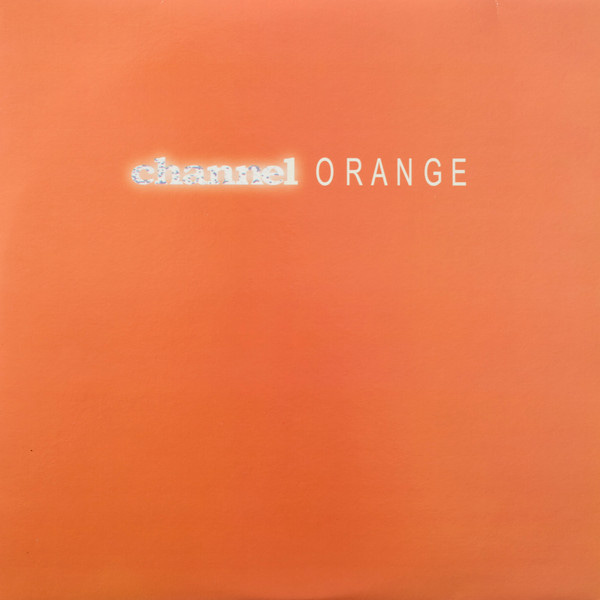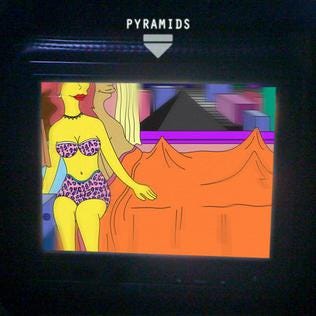Rescued Work: Frank Ocean's 'Pyramids'
DEF|Y|NE Media founder Matthew Allen revisits a 2013 examination into Frank Ocean's nine-minute opus from his debut album, "channel ORANGE," originally featured on the A+ app.
As a budding music journalist, I dreamt of writing for magazines, newspapers, and online publications. Eventually, I did achieve those dreams, writing for Ebony, Jet, and The Village Voice. But first, I got to contribute to an app.
In 2013, I got linked with Smokey Fontaine, via a connection from Michael A. Gonzales, a well-known music writer who took me under his wing. Fontaine, biographer of DMX, was helming a journalistic app, A+. He assigned me to craft a piece about rising singer/songwriter Frank Ocean.
Originally titled, Frank Ocean’s “Pyramids,” A Necessary Re-Examination, I wrote an intricate piece on the importance of one of my favorite compositions from the enigmatic artist. Since the app isn’t readily available, I present it to you all here at DEF|Y|NE Media:
(The single artwork for Frank Ocean’s “Pyramids,” the second single from his major label debut album, channel ORANGE.)
Frank Ocean is the new new hope of R&B; part of a three-horse race that includes Miguel and The Weeknd. Not as slickly sensuous as Miguel or transparently ominous as The Weeknd, Ocean, 25, is a cerebral and atmospheric storyteller. His traditional R&B textures filtered through slick, electro-urban production perfectly complements his dark, four-dimensional lyrics. His critically acclaimed 2011 mixtape, Nostalgia, Ultra, earned him attention. His contribution to Jay-Z and Kanye West’s “No Church in the Wild” won him a Grammy. Recording artists and YouTubers are posting covers of “Thinkin’ Bout You” left and right more than a year later.
Like most 21st-century musicians, Ocean also makes headlines with his extracurricular activities. Whether confessing falling in love with a man, coming to blows with Chris Brown over a parking spot, or the semi-violent antics of his Odd Future cohorts, the New Orleans native has stayed in the collective minds of the public. He’s sustained his success with his hit singles and by writing songs for the likes of Beyoncé, John Legend, and Brandy.
There’s one song that has received little attention that would be some much-needed food for thought. “Pyramids,” the second single of Ocean’s Grammy-winning Def Jam debut channel Orange, is the definitive representation of Ocean as an artist. It possesses the romantic melancholy of “Thinkin’ Bout You,” the socio-political commentary of “No Church in the Wild” and the enticing cynicism of “Novacane.”
“Pyramids” is nine minutes long and is split into two parts; the first half deals with the kidnapping of an African queen, and the second half tells the night in the life of a stripper. Although sounding like two different stories over two different beats, they are linked, painting a linear path of a pandemic of Black exploitation that continues to be perpetuated by many of today’s “artists.”
“Send the cheetahs on the loose;
There’s a thief out on the move;
Underneath our legion view,
They have taken Cleopatra…”
“Her skin like bronze and,
Her hair like cashmere,
As we march to the rhythm on the palace floor…”
The African queen is an icon of strength and gorgeousness; the epitome of Black femininity. She is strong enough to rule a nation and inspire men to be builders of cities and soldiers, coupled with an aura of grace and fragility that warrants worship and protection. Such is the ideal image of the Black woman in America; someone who wills their family to greatness with the sweat of her brow while still maintaining their gentility in the face of adversity.
“The jewel of Africa,
What good is a jewel that isn’t still precious…”
This passage in “Pyramids’” first half speaks of the defilement of the African queen once she’s “found laying down with Samson.” It wasn’t enough that she’d be taken from her nation, but her virtue had to be removed to ensure that said nation would lose faith and falter once “our queen has met her doom… no more, he has killed Cleopatra…” Such commentary sharply contrasts what’s being played on the radio today. Rapper Rick Ross was recently accused of apparently glorifying date rape In “U.O.E.N.O.,” an all-too-real reference to exactly what “Pyramids” is illuminating.
Ocean takes us back to the future to start the second half of “Pyramids.” It may be more than a millennia later in a lost wilderness called North America, but it is indeed the aftermath of the first story, once again painting a vivid picture of the setting:
“Big sun coming through the hotel blinds,
Wake to your girl,
For now let’s call her Cleopatra.”
Accompanied by a slower beat with a somber strobe of crunk-style keyboards, the image of our African queen, defiled and killed in Egypt, is now found in this new girl, off to work at a strip club called “The Pyramid.” Ocean uses the pyramid as the name of a gentleman’s club to illustrate the country’s downfall after the death of the lady pharaoh. It’s a metaphor for the residual effects that American slavery continues to have on Black Americans. Once a representation of ingenuity and innovation, The Pyramid in strip club form now shows how our sense of history is clouded by materialism.
As Ocean sings the refrain with a drowsy baritone “She’s workin’ at the Pyramid tonight,” you can almost see the inhabitants of the new Pyramid, once noble, proud people, transformed into libidinous zombies. Since slavery severed the lifeline of our knowledge of self and history, the post-slavery Black man became predisposed to reacting to his immediate past with indifference and distorted ignorance. It’s this loss of historical context that has given way to a culture that’s laid the foundation for rapper Lil’ Wayne using the gruesome lynching of Emmett Till as a metaphor for his sexual prowess in “Karate Chop (Remix).”
“Got rubies in my damn chain,
Whip ain’t got no gas tank,
But it still got wood grain;
Got your girl working for me…”
Cleopatra, now adorned “in her lipstick” and “her six-inch heels” is a shell of her former self, reduced to an object of a pimp, the ultimate image of exploitation. His appearance suggests an abundance of riches but the line “whip ain’t got no gas tank, but it’s still got wood grain” shows what’s on the outside is all that’s important to him and to her, but with that logic they won’t go anywhere.
After a night playing to the fantasies of faceless men, she returns to the hotel to make love to her pimp, still perpetuating the illusion of fortune despite a contradicting reality: “The way you say my name makes me feel like I’m that nigga, but I’m still unemployed.” Ocean caps off the message with the line, “But your love ain’t free no more.” The reprise of the phrase “no more” is no accident, as it was first used to close out the first half to signify the death of Cleopatra. Here it is again driving the point home even further; the image of the African queen has been forever altered.
(Still image from Frank Ocean’s “Pyramids” music video. Screenshot from YouTube.)
Today, we tend to punish Black women for possessing virtue and aspirations. Movie director/writer Tyler Perry depicts all ambitious women in his films as deceptive creatures. In his latest film, Temptation: Confessions of a Marriage Counselor, he uses H.I.V. as a thinly veiled form of religious retribution. Conversely, “Pyramids” illustrates the importance of an ambitious Black woman by explaining how the destruction of such a woman results in the downfall of the culture.
Ocean’s subtle social indictments and vulnerable persona is an essential antidote to singers and rappers getting big bucks for flaunting their jewels, the number of their bedpost notches, and measuring the value of a Black woman by how her ass looks in a thong. However, he’s careful to condemn the condition and not the messengers.
Unfortunately, “Pyramids” only reached 22 on the Billboard R&B chart and missed the Hot 100 altogether. Meanwhile, a year later, Perry’s movies gross millions and Wayne and Ross are tattooed on mainstream radio. Ocean will continue to make hits for himself and others, but after listening to “Pyramids,” it’s clear that he wants to do more than just entertain us. We should listen more closely, for it is an amalgamation of all his artistic merit and the merit we should seek within ourselves and hold other artists accountable.
THANK YOU FOR READING! If you enjoyed this piece, please subscribe to my page and share the piece on social media. Thanks again, and stay tuned for more!






